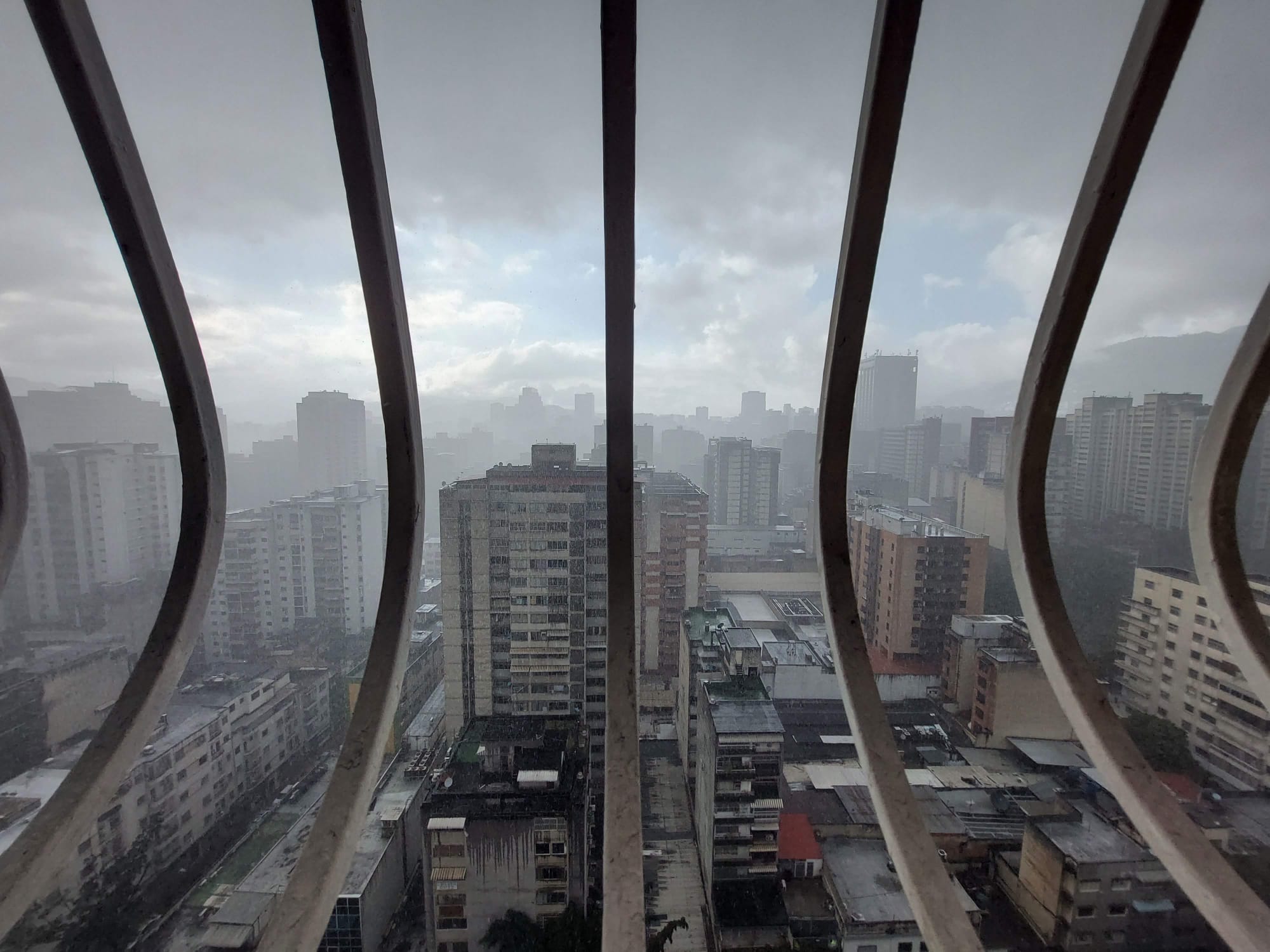I have been following the Venezuelan situation for several years. A significant part of my network comes from there, and I became fascinated by their stories. The nostalgia when they talked about their homeland—their youth in big cities like Caracas or in villages surrounded by untamed nature. The people. The food. How they used to spend holidays on the coast, with postcard-like beaches, but twice as beautiful.
In 2022, I travelled to Caracas by land from Colombia, aware that nothing remained of those stories. I encountered a Venezuela that is often compared to North Korea, only with rum and reggaeton. I met people and made friends. But above all, I learned to be sceptical.
On July 28, 2024, the day Venezuela held significant elections, I was glued to the screens. I was on standby via WhatsApp all day. I read hundreds of posts on Instagram and watched just as many reels on TikTok. I followed several live streams, sometimes multiple at the same time and through different channels. Why so much social media? Aren’t they prone to spread fake news?
On one hand, social media is the only thing that still connects Venezuelans. Since the beginning of the crisis, more than 7 million have fled the country (Informe Mundial 2024: Venezuela | Human Rights Watch (hrw.org)). The majority of families have been disrupted. They have only seen each other through video calls on WhatsApp for years. One reason to vote for the opposition was to reunite these families. To bring back all those young Venezuelans who have left and are potential, valuable citizens who can rebuild the country. A widely shared message on social media was: “Mothers of Venezuela, prepare yourselves. Make the beds and get the coffee ready; soon your children and grandchildren will return to Venezuela.”
On the other hand, we’re talking about a corrupt country where regular media is entirely censored. Official figures and reporting provide a distorted view of reality. News about what is really happening in the country, such as the violence the population has faced since the 28th of July, comes from the residents themselves and is spread through alternative channels.
July 28 started with hope. On the live streams, I saw how long lines had formed at polling stations the night before. Not only in Venezuela, but also in other countries throughout South and Central America. Venezuelans were driven by hope for a breakthrough for the opposition. People who wanted to ensure they could cast their votes in opposition to Maduro’s regime.
My Instagram feed was painted in the Venezuelan colours yellow, blue, and red. Venezuelan influencers proudly showed off their black, ink-stained index fingers as proof they had voted. They encouraged their followers to do the same despite intimidation at the polling stations from the chavistas, the Venezuelan socialists, and supporters of the current president, Maduro.
María Corina Machado, a previously disqualified presidential candidate, yet the most outspoken critic of the Maduro regime and the face of the opposition movement, appeared on Instagram all day travelling across various cities on the back of a motorcycle. She was greeted with cheers everywhere, smiling at the people, giving high fives, and even a few hugs.
Around five in the afternoon, I started receiving another type of videos on my WhatsApp. The contrast was enormous. Fernando Carrillo, a well-known actor, singer, and one of Maduro’s cronies, came out of a polling station in Caracas, filming himself, mocking an angry crowd to their faces. “The thieves have gone to vote,” was the next message I received.
From that moment on, the atmosphere on social media changed. I could hear it in the tone of the voice messages I received. One of my contacts in Caracas witnessed a failed fraud attempt: a woman intercepted with a purse full of fake votes for Maduro. In the accompanying video, I saw the woman being escorted to safety by the police, with bystanders throwing stones at her from all sides.
It is known that the Maduro government bribes people. People commit fraud for very little money, all in favor of a regime they are actually against. This must be understood in the context of widespread poverty and despair. More than three-quarters of the population lives in poverty. The majority of Venezuelans suffer from hunger daily. The minimum wage is around four euros per month, while food prices are roughly the same as in Western Europe.
The Maduro government tried to manipulate the elections in other ways as well. In the state of Táchira, two thousand people stood outside the closed gates of their polling station. Their right to vote was denied. Only chavistas were allowed inside. The iconic Maracaibo bridge, the main passage for Venezuelans coming from neighbouring Colombia, where about 2.5 million Venezuelan refugees live, was closed on Sunday. Returning Venezuelans could not cross the bridge to vote.
At six in the evening the election results were to be announced. Six o’clock became seven, Seven o’clock became eight. At eleven o’clock, there was still a lot of uncertainty. Meanwhile, the situation on the streets of Venezuela deteriorated. When the chavistas rode through Caracas in a long procession on motorcycles, we knew trouble was brewing. Shortly afterward, the colectivos, Maduro’s heavily armed paramilitary groups, moved toward the polling stations. In various footage, you can see them loading votes into trucks, despite the resistance of bystanders.
In Venezuela, the law of the strongest prevails. The strongest, the biggest weapon. People who work for the government, such as the colectivos, the police, and the military, receive the biggest weapons. When the colectivos stole the votes of the Venezuelan people from the polling stations, the resistance of the citizens was crushed with disproportionate violence. In the last hours before the election results, a brutal conflict broke out between the paramilitary groups and the Venezuelan people. My WhatsApp was flooded with images of brutally murdered civilians.
On July 28, an entire country voted for the opposition. On July 29, I woke up to the news from the Dutch-speaking media that Maduro had been “declared the winner of the Venezuelan elections” and that the opposition “fears fraud.” Maduro is not a winner. More than 70% of the votes went to the opposition party of Edmundo Rojas and María Corina Machado. Maduro stole those votes and declared himself the winner. The opposition does not “fear” fraud. They, along with the Venezuelan people, witnessed it.
It is night in Venezuela. I received a video recorded in an apartment in Caracas. From a bird’s eye view, I see the dark and empty streets of the neighbourhood. The audio is heartbreaking. An echo rings through the streets: “No puede ser” (It can’t be true) is repeated, crying. This is Venezuela. Every form of hope is taken from the people with extreme violence. Venezuelans are prisoners of a regime that does not allow them to have a future.
“It is the calm before the storm.” I speak with a young Venezuelan man who lives in Spain. He migrated there three years ago. He is twenty years old and has a daughter. According to him, this is a repetition of the past, of all previous protests against the regime have led to nothing: “When I was a teenager, I was there. I tried to resist the corruption and violence of the regime together with others. We didn’t know each other, but in those moments, we were brothers. We were all in the same misery. We were hungry. No money. Nothing to defend ourselves against the government’s weapons. But so much injustice makes people lose their fear. We chose to throw stones at the armed forces. I saw young people shot dead on the streets. Killed by their own government. I saw how others were imprisoned. Can you imagine a prison in Venezuela? I am convinced that it is better to die.”
No, I can’t imagine such a place. Nor can I imagine what it is like to be Venezuelan at this moment. The disappointment. Another six years of a repressive Maduro regime. Six years without any prospect of improvement. Increasing corruption. Injustice. Violence. Young people who see no other way out than to leave the country, whether by legal or precarious means.
Since July 29, there has been fighting. Across the entire country. The government, with its colectivos, the military, and the police against the people. Hospitals are overflowing with the wounded. Staff are trying to save who they can. Surgeries are being performed without light, while supplies of materials and medication are running out. The promised bloodbath by Maduro has arrived.
The country is on the brink of civil war. The government will not stop using violence against the people protesting. On the other hand, Venezuelans will continue to resist because they have nothing left to lose. The good news that the opposition has more and more evidence of electoral fraud gives a glimmer of hope. As does the international pressure currently being placed on Maduro. Still, many Venezuelans receive this with scepticism. If Maduro leaves, it will be with violence: “El régimen no sale con votos, sale con balas” (The regime doesn’t leave with votes, but with bullets).




